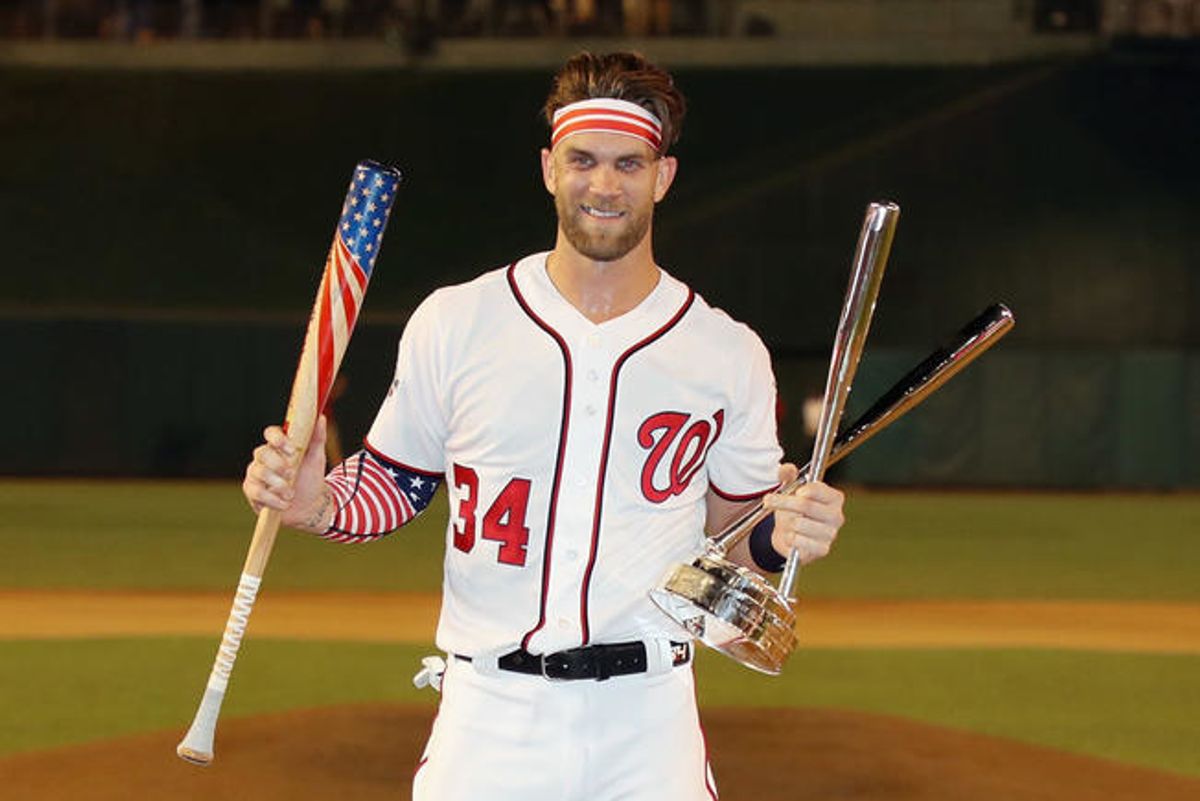
Rob Carr/Getty Images
My affinity for the game of baseball goes back to the late '80s. Most of my fondest sports memories and obsessions trace themselves back to that time. I was the kid who wanted to know everything about anything I was interested in, and sports was at the forefront of my inquisitive beginnings.
I remember the Bash Brothers in Oakland, Orel Hershiser's '88 season, and the Reds ending the A's dynasty (as well as Rob Dibble and Chris Sabo's speeches at their celebration). My favorite team back then were those Braves' teams of the '90s. We moved to Atlanta the summer of '91 in the midst of them going worst to first and beginning their run.
As I grew older, I began to look into the business side of things in sports. Contracts, their structure, salary caps, team revenue streams, etc. Whatever I could read about or research, I found fascinating. Keep in mind, this was just before and during the internet boom. I didn't have quality internet access until I was a freshman in college.
One thing that has stood out to me is the fact that baseball players have the highest average salaries of all major pro sports in this country. They play a 162-game schedule, plus playoffs, over a seven month period. Playing almost everyday is tough, but it isn't as physically demanding as football, or as fast-paced as basketball.
Over the last few offseasons, baseball has seen a switch in philosophy. No longer are teams backing up the Brinks truck and giving free agents a blank check. Top stars like J.T. Martinez, Jake Arrieta, Bryce Harper and Manny Machado have all found themselves without the deals they were expecting heading into spring training. Part of the reason is that baseball is no longer as popular, therefore no longer as profitable, as it was years ago when guys like Alex Rodriguez could get multiple $200 million-dollar plus contracts.
Another reason is the obviously more team-favorable system when it comes to players under team control. I have a proposal to help fix baseball's broken system:
Players are placed under team control for at least six years on an active 25-man roster. Teams will often hold players down in the minors, or stashed on the 40-man roster, until they feel they're ready to start their six year clock in the big leagues. Prime example locally is George Springer. He won't be a true free agent until he's 31. I propose teams sign their drafted rookies to similar deals like the NBA and NFL have. A simple four or five year deal, with team options for the fifth or sixth year seems logical. However, if the player is still in the minors or not, the team would have to resign him to a new deal. This eliminates the team from stashing the player and holding off his 25-man roster clock. This also rewards the player for working hard and getting to the big leagues sooner rather than later.
Teams will benefit under this system if they're able to sign a player to a long term extension before or after his rookie deal is up, but before he prices himself out of their budget. Smaller market teams would have a better chance to retain their players, rather than losing them upon hitting free agency. An example of this is when the Rays signed Evan Longoria to a six-year deal a few years before he was set to be a free agent instead of going to arbitration. Many were shocked he took the deal, but he bet on himself and the team bet on him living up to an early deal.
This was a mere conversation starter about a sport I feel that could be on the verge of losing its place in our sporting pantheon. Baseball is a game that needs more help that it's willing to admit. Soccer is itching to take baseball's place. It's growing like weeds and prone to take over if baseball doesn't weed and feed it's lawn.
Most Popular
SportsMap Emails
Are Awesome
Oswald Peraza hit a two-run single in the ninth inning to help the Los Angeles Angels snap a three-game losing skid by beating the Houston Astros 4-1 on Saturday night.
Peraza entered the game as a defensive replacement in the seventh inning and hit a bases-loaded fly ball to deep right field that eluded the outstretched glove of Cam Smith. It was the fourth straight hit off Astros closer Bryan Abreu (3-4), who had not allowed a run in his previous 12 appearances.
The Angels third run of the ninth inning scored when Mike Trout walked with the bases loaded.
Kyle Hendricks allowed one run while scattering seven hits over six innings. He held the Astros to 1 for 8 with runners in scoring position, the one hit coming on Jesús Sánchez’s third-inning infield single that scored Jeremy Peña.
Reid Detmers worked around a leadoff walk to keep the Astros scoreless in the seventh, and José Fermin (3-2) retired the side in order in the eighth before Kenley Jansen worked a scoreless ninth to earn his 24th save.
Houston’s Spencer Arrighetti struck out a season-high eight batters over 6 1/3 innings. The only hit he allowed was Zach Neto’s third-inning solo home run.
Yordan Alvarez had two hits for the Astros, who remained three games ahead of Seattle for first place in the AL West.
Key moment
Peraza’s two-run single to deep right field that broke a 1-1 tie in the ninth.
Key Stat
Opponents were 5 for 44 against Abreu in August before he allowed four straight hits in the ninth.
Up next
Astros RHP Hunter Brown (10-6, 2.37 ERA) faces RHP José Soriano (9-9, 3.85) when the series continues Sunday.

